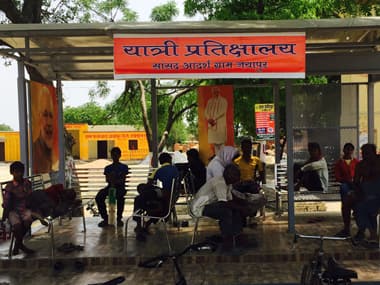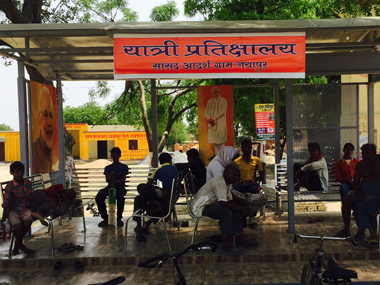Jayapur (Varanasi): Narendra Modi’s poll slogan Sabka Saath Sabka Vikas promised inclusive growth for all Indians. US Secretary of State, John Kerry, was so impressed by Modi’s ‘taking everyone along, development for all’ vision that he publicly praised the new Prime Minister. President Pranab Mukherjee too patted Modi on the back for his seemingly inclusive developmental agenda. In practice, however, the Prime Minister’s actions have been far less inclusive. On 7 November, the PM zeroed in on Jayapur village of Varanasi under the Sansad Adarsh Gram Yojana – a scheme for MPs to adopt a village in their constituency and develop it with all the resources at their command. [caption id=“attachment_2256446” align=“alignleft” width=“380” class=" “]  The waiting room at the bus stop in Jayapur. Image courtesy: SNM Abdi[/caption] Jayapur has many noteworthy qualities, the most prominent being the fact that it is 100 percent Hindu. There isn’t a single Muslim, Christian or Sikh there. And yet Modi chose it over many others to develop into a model Indian village. Why Jayapur? What made Modi adopt Jayapur in the first place? From what I have pieced together, he first heard about its existence when the media reported that five persons, including a young woman called Dimpy, had died a horrible death there when lightning struck a high voltage power cable. The “calamity” struck a chord in Modi’s heart. Subsequently, it emerged that no one had died! The accident had resulted only in minor burn injuries. But by then RSS had put the stamp of approval on Modi’s choice as Jayapur wasn’t an unknown quantity for the Hindutva fountainhead; RSS had adopted it way back in 2002 under its Ideal Village Scheme as it had no Muslims, and was predominantly high caste and quite affluent with negligible Scheduled Caste presence. So there was no going back. Even as the choice of Jayapur flies in the face of Modi’s Sabka Saath Sabka Vikas promise, many BJP MPs have taken a leaf out of Modi’s book. A random survey, covering 20 Lok Sabha seats out of 71 won by the BJP in Uttar Pradesh, conducted soon after Modi’s adoption, revealed that 16 out of 20 BJP MPs had adopted villages with no Muslims under the Sansad Adarsh Gram Yojana. Jayapur, the village of plenty Thanks to Modi, unlike other villages in the vicinity, Jayapur has newly-opened branches of Union Bank, Syndicate Bank and State Bank of India with ATMs, 135 solar streetlights, 12 bio-toilets, 14 one-room houses for Vanvasi tribespeople, a 17-seater bus for ferrying locals to the Rajatbala market eight km away, two waiting room for commuters, several benches bearing Modi’s name and an under-construction overhead reservoir for supplying piped water to every household in the near future. Overseeing Jayapur’s development are two trusted Modi aides – Nripendra Misra, Principal Secretary to the PM, and CR Patil, BJP MP from Navsari in Gujarat who is such a key player and regular visitor that it is he — not Modi — who is known as “Sansadji”, or Member of Parliament. Varanasi District Magistrate Pranjal Yadav pays a monthly visit with subordinate officials like the Tehsildar and Block Development Officer in tow. I visited Jayapur on 3 May. It was a Sunday but all three banks were open! In the Union Bank branch I found Samir Kumar Sain, Lead District Manager, and Prosenjit Shee, Branch Manager, immersed in paperwork ahead of the 9 May launch of Pradhan Mantri Jeevan Jyoti Bima Yojana and Pradhan Mantri Suraksha Bima Yojana. “Naturally there is sharper focus on Varanasi as it’s the PM’s constituency”, Sain told Firstpost. “And Jayapur is a very special case because it has been adopted by the PM, no less. So it’s getting a little extra care and attention!” Trouble in paradise The first villager I bumped into was Phool Chand Verma, a 65-year-old retired health department employee. So have achche din arrived, I asked? Verma replied: “The PM didn’t owe us anything. He could have just ignored us and adopted another village. So we are extremely grateful and overjoyed with whatever we are getting.” Durgawati Devi, Jayapur’s Sarpanch, told Firstpost about a private conversation with the PM before the public function held during his lone visit to his adopted village. “What can I do for Jayapur?”, Modi supposedly asked, to which the Sarpanch replied: “Aap to sansar ke malik hain aur hum praja - You are the Lord of the world and we are your subjects.” Modi apparently broke into a laugh and promised to do everything possible under the sun. Devi’s husband, Jeet Narayan Patel, was elected Sarpanch in 2008. After his accidental death, Devi won the byelection that was held. She appointed her late husband’s younger brother, Narayan Patel as her “chief representative”. But he is a controversial figure; his visiting card carries Narendra Modi’s photo; and dissatisfied villagers Firstpost spoke to predicted Devi’s defeat in the next Sarpanch election in October due to corruption allegations against her ambitious brother-in-law. Ravindra Pratap Singh, a retired Indian Army Naik, complained loudly about Narayan Patel and Devi to Nripendra Misra, Principal Secretary to the PM, when walked around Jayapur on a recent visit. The burden of Singh’s lament was that Patel and Devi were minting money from contracts and terrorising anyone who didn’t grovel before them. The ex-soldier claimed that he too was being targeted. “Thieves are running amok in Jayapur. Unless corrective steps are taken, an ‘explosion’ is inevitable. And because of the Modi tag, the whole country and the world will sit up and take notice when the ‘explosion’ takes place. The administration’s attempts to stifle protests won’t succeed,” Singh told Firstpost. The apple of Modi’s eye Modi has also gifted Jayapur – figuratively the apple of his eye - 100 Kashmiri apple tree saplings so that the villagers can cultivate the heavenly fruit making them both healthy and wealthy. Many of the saplings planted are withering in the scorching heat. But some villagers have lovingly erected bamboo enclosures around the saplings to protect them from troublesome weeds and stray goats hoping that they will ultimately bear fruit. “Just imagine trees laden with apples in this village! Some leaders change the course of history. But Modiji will change what’s written in geography textbooks if his bid to grow apples in Varanasi succeeds”, Trilok Singh, an LIC agent, observed over tea and biscuit. While the fate of the Kashmiri apples is still uncertain, pampered Jayapur isn’t complaining. In six months, it has got many times more than what Varanasi - the PM’s constituency – or the nation has in a whole year.
Modi zeroed in on Jayapur village of Varanasi under the Sansad Adarsh Gram Yojana – a scheme for MPs to adopt a village in their constituency and develop it with all the resources at their command.
Advertisement
End of Article


)

)
)
)
)
)
)
)
)



